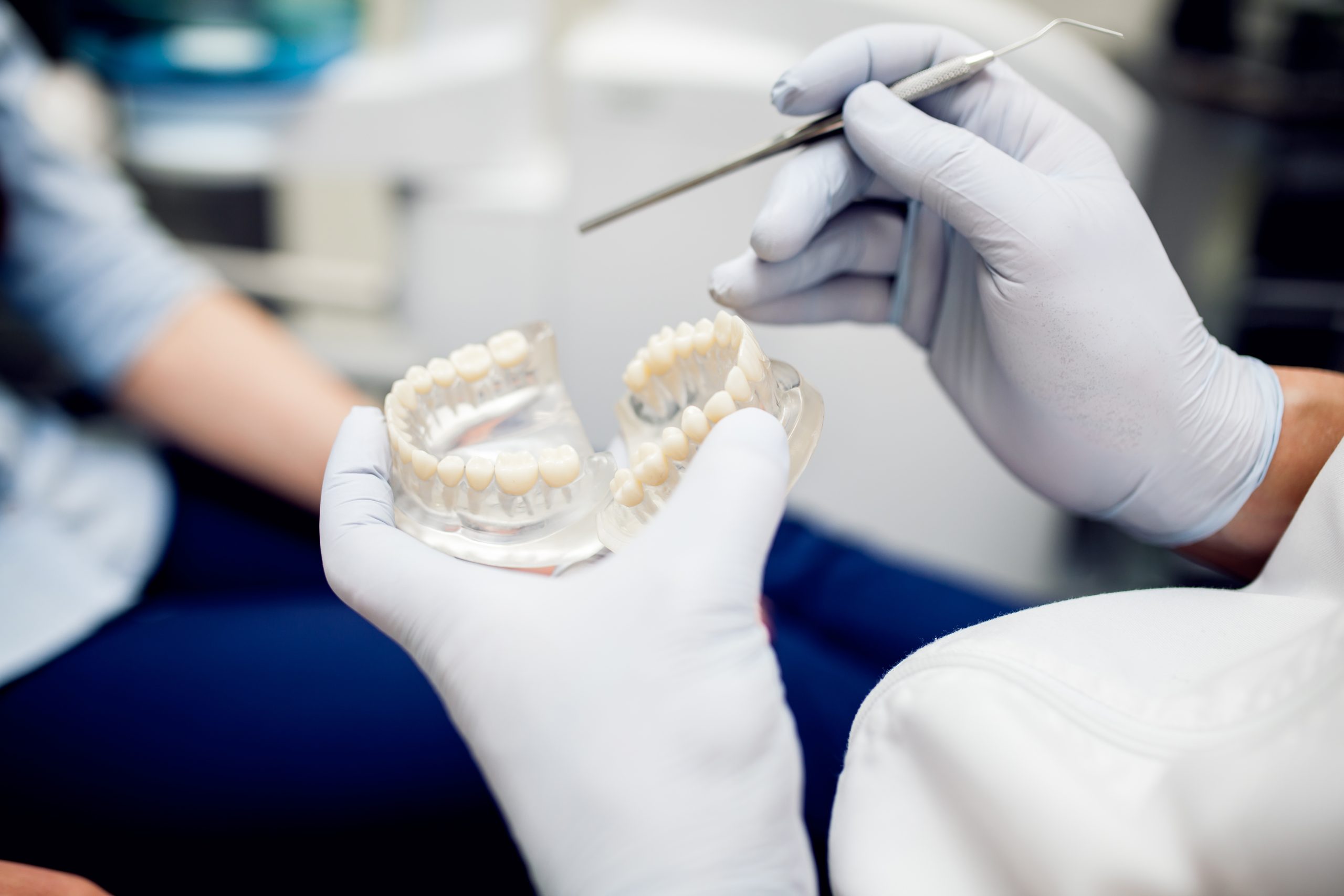Getting dentures is an essential step in restoring your ability to chew, speak, and maintain facial structure after tooth loss. For many, it also supports day-to-day comfort and function. However, adjusting to wearing dentures often takes time, especially in the first few weeks.
You may be wondering, “Are dentures difficult to live with?” It’s a common question, especially during the early stages of wearing them. While challenges like denture discomfort, difficulty eating, or the sensation that dentures feel loose can occur, many of these concerns ease as your mouth adjusts.
This guide explores some of the most common denture problems and offers practical tips to help you manage them. Whether you’ve just started to wear dentures or are going through the adjustment phase, you’re not alone, and small changes can make daily life with dentures more manageable.
- Dentures can restore function and appearance, but adapting to them involves an adjustment phase where challenges are common and manageable with care.
- During the first few weeks, many people notice sore gums, extra saliva, or minor speech changes as the mouth adjusts to the new appliance.
- Chewing difficulties often occur early, especially with hard or sticky foods, but starting with a soft diet and cutting food into smaller pieces can help.
- Slipping dentures may result from bone resorption or a worn denture base, and professional relining or replacement may improve stability.
- Speech changes are temporary, and reading aloud or speaking slowly can help the tongue and mouth muscles adapt.
- Excess saliva or dry mouth may occur; drinking water and maintaining good oral hygiene can help.
- Regular dental check-ups, proper cleaning, and avoiding DIY adjustments support long-term comfort and oral health.
New Dentures: What to Expect in the First Few Months
Dentures are removable appliances designed to replace missing teeth and support the surrounding structures of the mouth. They can help restore the ability to chew food, support speech, and maintain facial balance. Whether you have partial dentures, full dentures, or immediate dentures, your body will need time to adjust.
When you first begin wearing dentures, it’s completely normal to experience some changes. You may notice increased saliva production, minor sore spots, or a feeling that your dentures feel loose. These sensations are part of the initial adjustment as your oral tissues, mouth muscles, and gums adapt to the new shape and feel of the dental appliance.
The adjustment period usually lasts a few weeks to a few months. During this time, your ability to chew, speak, and tolerate different foods will gradually improve. It’s important to remain patient and consistent with proper denture care, even when things feel unfamiliar.
Remember, new denture wearers often face unique challenges in the beginning. This doesn’t mean your dentures aren’t working—it means your mouth is working towards adapting. With care, support, and regular dental visits, many people find that life with dentures becomes easier over time.
Common Denture Complaints (and Why They Happen)
Adjusting to new dentures can bring a range of challenges. These are common experiences linked to how the mouth muscles, oral tissues, and gums adapt to the dental appliance. Below are some of the most frequent concerns, why they occur, and practical ways to manage them.
Sore Spots and Gum Irritation
Sore gums and gum irritation are often caused by friction between the denture base and the soft tissues of the mouth. This may occur if you have ill-fitting dentures or as the shape of your gums and supporting tissues changes naturally over time. Professional adjustments are often recommended to improve comfort and maintain a proper fit. While denture adhesives can sometimes provide short-term relief, relying on them too heavily may hide the need for further care. If you are experiencing persistent discomfort, arranging a review can help address the problem before it leads to further irritation.
Difficulty Eating Certain Foods
Chewing with dentures feels different from chewing with natural teeth, which can make some foods more challenging in the beginning. Hard foods, raw vegetables, or sticky foods may place extra pressure on the denture base and contribute to denture discomfort. It is often recommended to start with a soft diet, including meals such as mashed potatoes or other soft foods, while you adapt. Cutting food into smaller pieces can make chewing more manageable. Over a few weeks, as your mouth adjusts, it may become easier to reintroduce a wider variety of foods at a comfortable pace.
Slipping Dentures or Dentures Feel Loose
Over time, bone resorption after tooth loss can change the shape of the jaw, which may cause dentures to feel loose. A worn denture base can also reduce stability, making it harder for dentures to stay in place. In these situations, options such as relining, rebasing, or replacement may be recommended to help achieve a more comfortable and functional fit. Attempting to adjust the dental appliance at home is not advised, as this may cause more harm than good. Regular reviews can identify these changes early and allow timely adjustments to support ongoing oral health.
Speech Changes and Lisps
Speech changes are common when new denture wearers first begin adapting. Some people notice difficulty speaking clearly or experience a temporary lisp. This happens because the tongue needs time to adjust to the new shape and surface of the dentures. Reading aloud or speaking slowly may help the mouth muscles adapt. Speech changes often improve gradually as the mouth adjusts throughout the adjustment phase.
Excess Saliva or Dry Mouth
Increased saliva production is common in the early stages of wearing dentures, as the saliva glands adjust to the new presence in the mouth. For some people, the opposite occurs, and they develop dry mouth, which is often linked to medication or dehydration.
Staying hydrated by drinking water regularly can make a difference. It also helps to limit sticky foods, such as toffees, chewy lollies, or dried fruit, as these can cling to dentures and irritate the gums. Maintaining good oral hygiene, including gently brushing with a soft-bristle brush and cleaning your dentures daily, can also provide relief.
If dryness or excess saliva continues for several weeks, it is advisable to seek guidance from your dentist or doctor. Rinsing your mouth with warm saltwater is a simple step that may provide short-term comfort if you experience gum irritation.
How to Overcome Denture Challenges
Some people may wonder, “Are dentures difficult to live with?” The truth is that while dentures can present challenges, there are safe and practical ways to manage them. The following suggestions can make wearing dentures more manageable. These are general tips only, and they are not a replacement for personalised dental advice. For guidance tailored to your needs, it is recommended to consult your dentist. You can also find reliable information from trusted sources such as the Australian Dental Association (ADA).
Gradual Wear Increase to Build Comfort
When you first start wearing dentures, it can help to begin with shorter periods and gradually extend the time. This allows your gums, oral tissues, and mouth muscles to adapt without becoming overwhelmed. Research shows that adapting to new dentures may take a few weeks to a few months. This variation depends on factors like gum health and the presence of remaining natural teeth.
Proper Cleaning Routine
Regular daily care of your dentures supports both comfort and long-term oral health. The ADA recommends brushing dentures daily with a soft brush and a non-abrasive denture cleaner. Avoid using hot water, as it may warp the dental appliance and affect its proper fit. Rinsing your mouth and clearing away food particles after meals can also help prevent irritation and plaque buildup.
Regular Dental Check-Ups for Fit Adjustments
Even with proper care, ill-fitting dentures can develop over time due to bone resorption and natural changes in the oral tissues. Regular dental check-ups provide an opportunity to identify these changes and make adjustments that may reduce the risk of problems such as sore gums, denture discomfort, or difficulty chewing. Reviews can be helpful not only if you are experiencing pain but also as a proactive step in monitoring and maintaining your oral health.
Avoiding Risky DIY Methods
It may be tempting to attempt quick adjustments at home, but trying to bend or glue dentures can cause injury or worsen the fit. These methods may damage the denture base or irritate the oral tissues, which can lead to further complications. Seeking care from a professional helps reduce the risk of unnecessary harm and may promote better comfort.
Benefits of Persistence vs When to Seek Immediate Review
Adapting to new dentures takes time, and it is common to experience some denture discomfort during the first two to four weeks. During this stage, you may notice sore spots, increased saliva production, or slight difficulty speaking. These changes are usually part of the process as the mouth adjusts, and for many people, improvements are noticed within four to six weeks. In some cases, it may take up to two to three months before you feel entirely comfortable.
Although patience can be helpful in this early period, there are times when professional advice should not be delayed. Severe or persistent pain, dentures rubbing and causing sore gums, or sudden looseness in how your dentures fit may signal a problem. Similarly, if eating or speaking becomes more difficult after the initial adaptation phase, it is important to consult your dentist promptly.
Mild challenges are usually expected in the early stages, but symptoms that continue or worsen should be reviewed. Seeking timely care supports your oral health and may help prevent further complications.
Final Thoughts
The question, “Are dentures difficult to live with?” is a natural consideration when thinking about this type of dental appliance. While adapting can take time, there are practical ways to manage most challenges. Approaches such as gradual wear, proper cleaning, and regular dental check-ups can make the transition smoother.
If difficulties continue, a professional review can help identify the cause and provide options tailored to your needs. You can arrange a consultation at Karrinyup Dental Centre to discuss your denture care in more detail.





